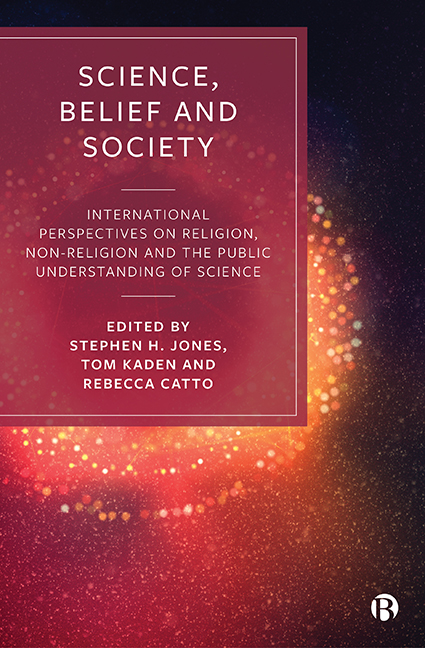 Science, Belief and Society
Science, Belief and Society Book contents
- Frontmatter
- Contents
- List of Figures and Tables
- Notes on Contributors
- Editors’ Acknowledgement
- Foreword
- Editors’ Introduction: Science, Belief and the Sociological Tradition
- PART I Methodological Challenges in the Study of Science and Belief
- PART II Belief in the Study of Science and Technology
- PART III Science, Culture and Non-religion
- PART IV Religion, Conflict and Moderation
- Conclusion: Future Directions in the Sociological Study of Science and Belief
- Index
Foreword
Published online by Cambridge University Press: 27 April 2022
- Frontmatter
- Contents
- List of Figures and Tables
- Notes on Contributors
- Editors’ Acknowledgement
- Foreword
- Editors’ Introduction: Science, Belief and the Sociological Tradition
- PART I Methodological Challenges in the Study of Science and Belief
- PART II Belief in the Study of Science and Technology
- PART III Science, Culture and Non-religion
- PART IV Religion, Conflict and Moderation
- Conclusion: Future Directions in the Sociological Study of Science and Belief
- Index
Summary
This very welcome book explores the interconnections between science, belief and society. In this Foreword, I want to emphasize the urgency of this question (or, more accurately, questions), with reference to a particular example: the publication in 2015 of Pope Francis's second encyclical, ‘Laudato Si’ : on care for our common home’ (Francis, 2015).
It is clear to all those engaged in the debate surrounding climate change that Laudato Si’ has been a game-changer, and for two reasons. First, it has vastly extended the range of participants, and, second, it has drawn on established scientific research to deliver a powerful ethical message: that deprived communities are likely to suffer most from climate change as currently experienced.
An opinion piece in The Guardian puts it thus: ‘Pope Francis's encyclical on climate change, Laudato Si’, is the most astonishing and perhaps the most ambitious papal document of the past 100 years, since it is addressed not just to Catholics, or Christians, but to everyone on earth’ ( The Guardian, 2015). The following sentence goes further still: it argues that the encyclical sets out a programme for change that is rooted in human needs but makes ‘the radical claim that these needs are not primarily greedy and selfish ones’ ( The Guardian, 2015). Rather, we need nature just as we need each other. Thus, the care for nature and the care for the poor are two sides of the same coin. The environment, in the Pope's understanding of the term, captures the underlying connectedness of the world and all those who inhabit it. It is this relationship – the indissoluble link between nature and human beings – that lies at the heart of the document.
Even more striking is the editorial in Nature, a prestigious and widely cited scientific journal. Here, the encyclical is warmly commended for the accuracy of the science. However, even more arresting is the awareness that the moral authority and popularity of the Pope will ensure a readership that scientific papers can only dream of; the Catholic Church, moreover, ‘has a superb means of spreading the word every Sunday’ (Nature, 2015). This is not the phraseology that one expects from a scientific journal of this standing.
- Type
- Chapter
- Information
- Science, Belief and SocietyInternational Perspectives on Religion, Non-Religion and the Public Understanding of Science, pp. xv - xviiiPublisher: Bristol University PressPrint publication year: 2019


